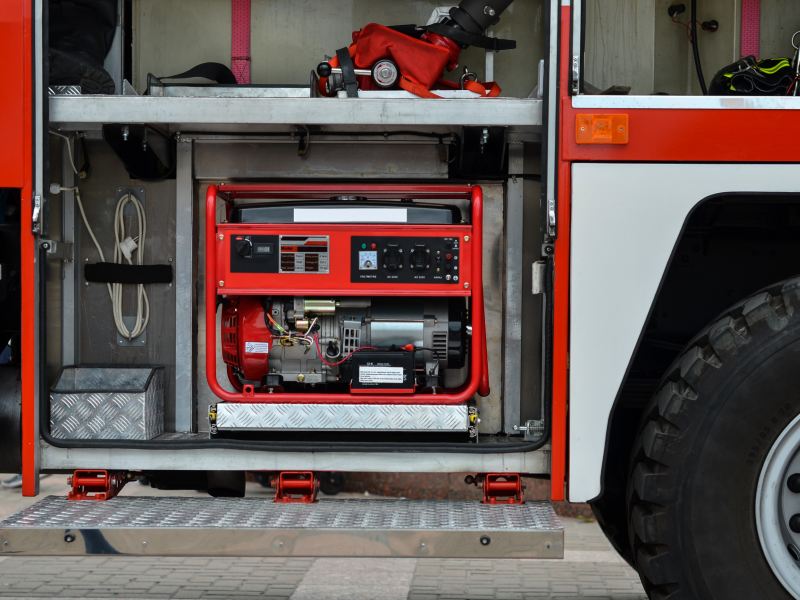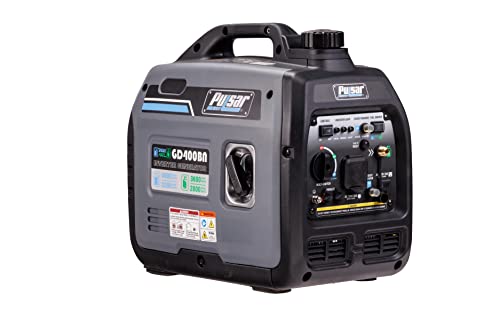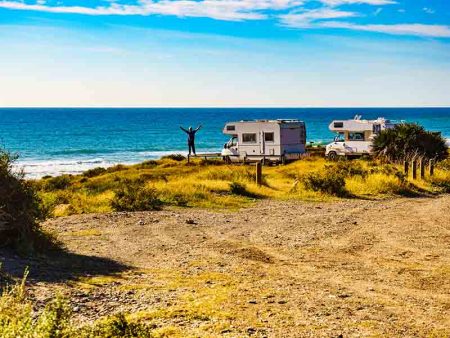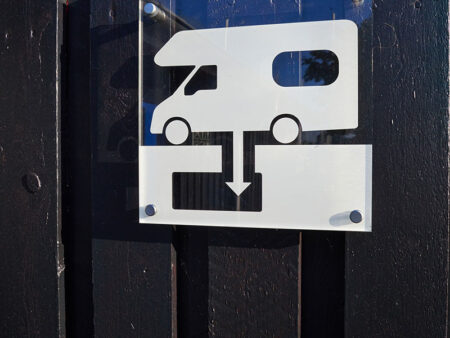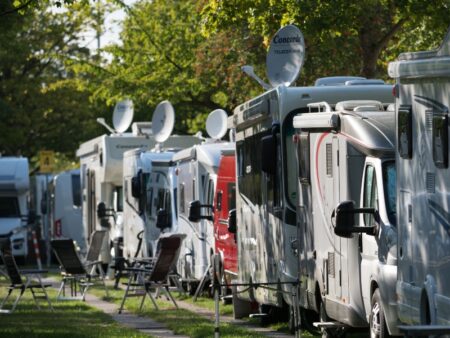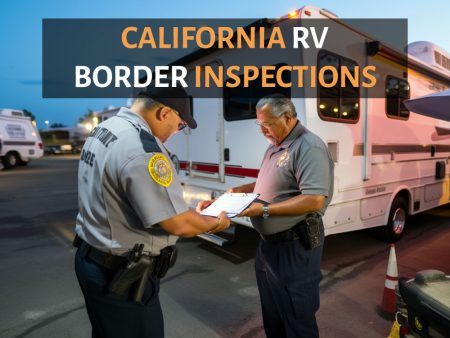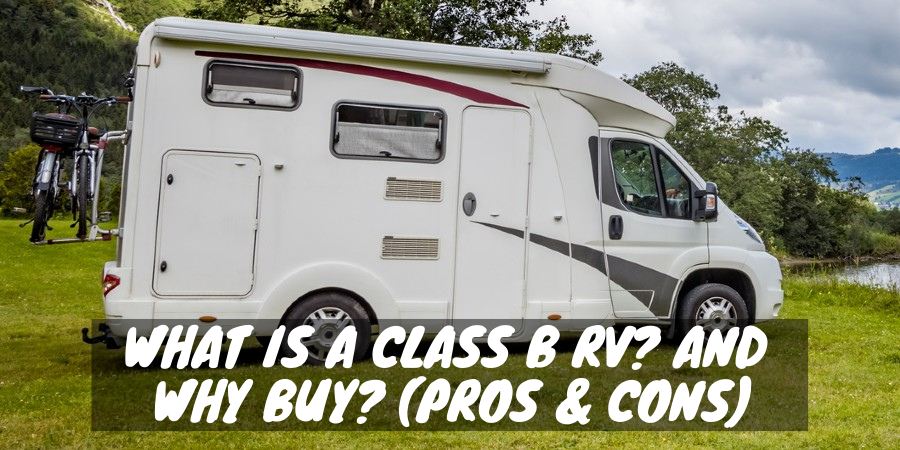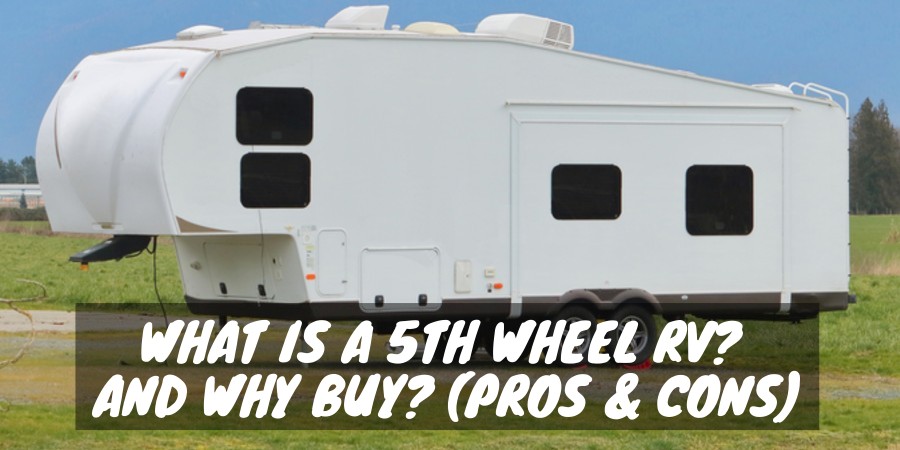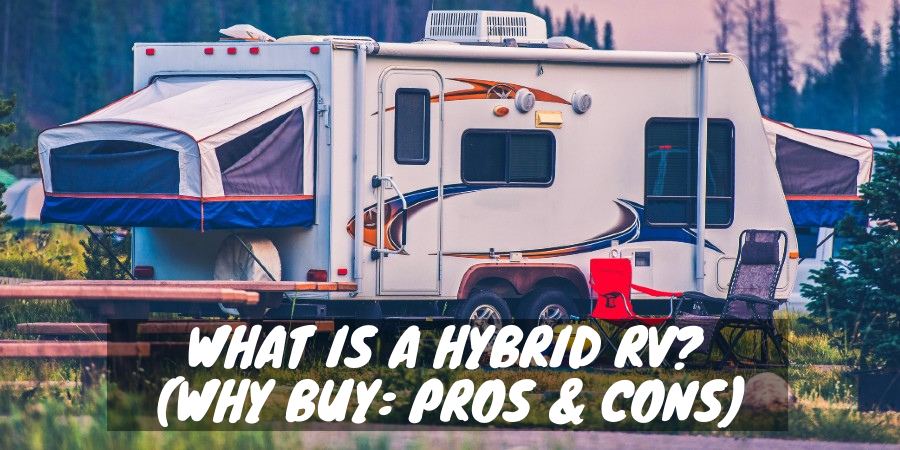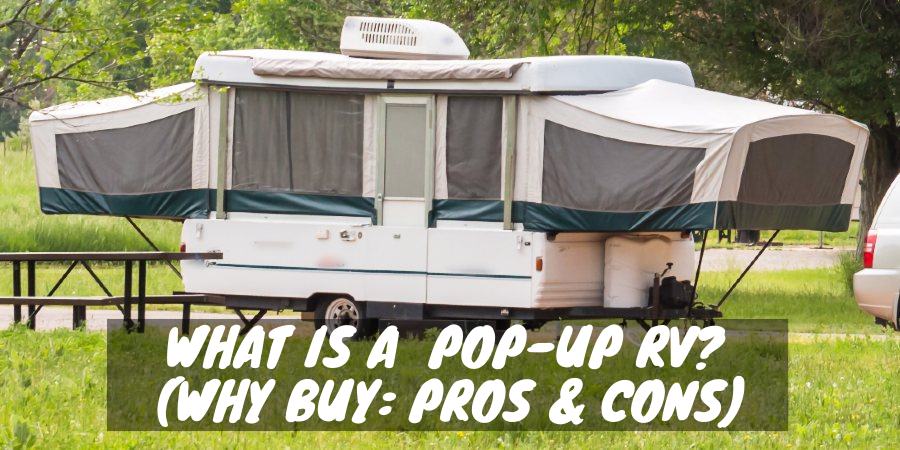Questions have been swirling in the RV community about the rules in California regarding a ban on RV generators. With new clean-energy bills passing in the state, how will the regulations to control pollution and emissions affect recreational vehicle owners?
For RVers who rely on a generator for boondocking or for when shore power goes out in a campground, knowing the laws and avoiding fines when camping in California is important. So, are RV generators now banned in California?
Below, I detail the California regulations about generator use and how they impact RV owners so you can plan to meet the new standards when they go into full effect.
California Ban On Gas-Powered Engines
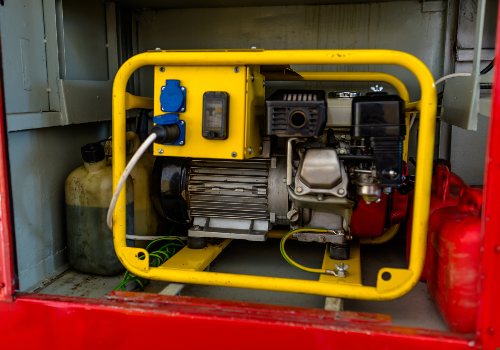
In October of 2021, Assembly Bill 1346 passed in the California state legislature that specifically bans selling new portable equipment (off-road) that uses a gas-powered engine. The initiative is to reduce harmful emissions and protect the environment.
The bill aims to make small, portable gas engines meet zero-emissions standards by 2024. The ban includes other common household tools and equipment, such as:
- Leaf blowers
- Lawnmowers
- Chainsaws
- String trimmers
- Golf carts
- Pressure washers
- Portable generators
- Snowblowers
Since many RV generators have gas engines, this will impact campers and travelers who visit California. While the immediate ban does not include existing portable generators for residential or RV use, it will extend to them in the future.
The bill’s plan is for off-road (portable) engines to meet the environmental standards by 2024 but will include all portable generators, even RV generators, by 2028.
The bill has both strong supporters and opposition from those who rely on gas-powered equipment when Califonia’s electric power grid fails or deals with rolling blackouts.
As the bill plays out over the next five years, the challenges manufacturers face may impact changes in the law. But for now, the RVing community should prepare for alternative means of power production when shore power isn’t available.
How the Stages of California Bill 1346 Go Into Effect
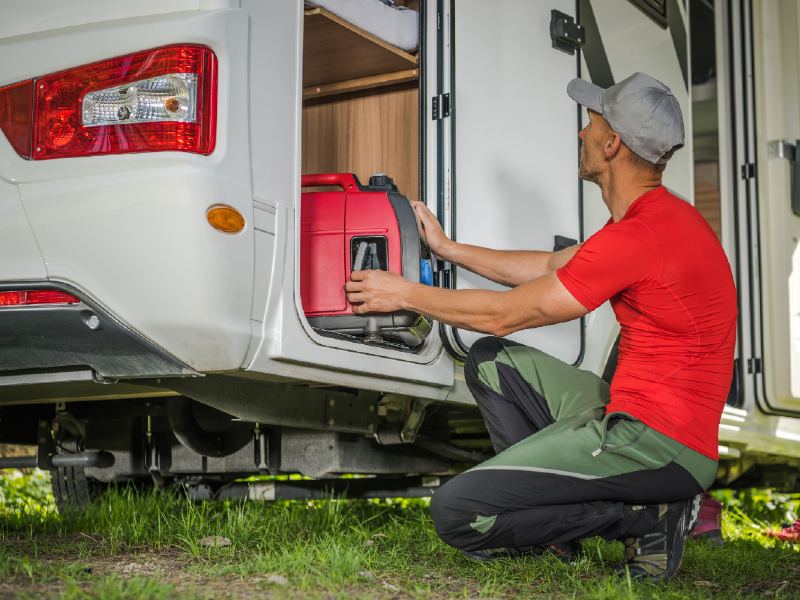
The California off-road gas-engine ban is not a single-stage bill. Instead, the legislation has various stages and timelines that will culminate in the law’s final version for all gas-powered portable engines.
Stage One
The first portion of the bill was for a California state board to create regulations for manufacturers or sellers of off-road engines. The board had until July 1, 2022, to finish this task.
The law reads in part: “The state board shall adopt technologically feasible and cost-effective regulations to prohibit small engine exhaust and evaporative emissions from new off-road engines. The regulations shall apply to engines produced on or after January 1, 2024, or as soon as the state board determines it is feasible, whichever is later.”
Once the California state board completes the list of regulations they wish to adopt, they will post and enforce the rules and apply them to creators or sellers of off-road engines by January 2024.
Stage Two
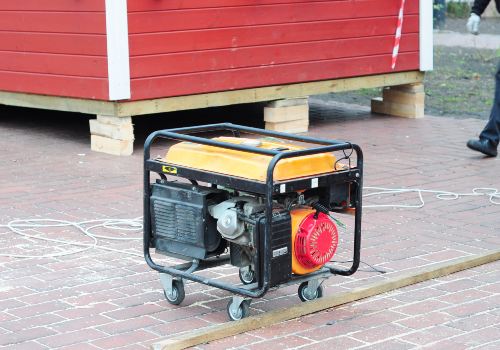
After the law goes into effect at the beginning of 2024, no one can sell or purchase new products with gas-powered off-road engines.
The ban will hit the lawn and garden sector the hardest, as various tools and equipment, both small and large, use gas-powered engines for the power and longevity they provide. Homeowners also rely on gas-fueled portable generators in times of local power outages.
Altering gas-powered engines to meet zero-emission standards will be expensive or impossible, leaving consumers struggling to find suitable and affordable alternatives to these products.
Stage Three
After the zero-emission policy goes into effect in early 2024, the next step in the bill is to extend the reach of the regulations to include portable gas generators for residential, recreational vehicles, or boating use.
Portable generator manufacturers will have until 2028 to meet the zero-emission standards set by the state board, or they will be unable to remain in business.
Gas Generators and More Banned in California (Video)
Will California Help Small Businesses Transition To New Equipment?
Many small businesses, such as landscaping or construction companies, will need to buy all new equipment to meet the new California emission regulations.
For company owners affected by the new bill, the state has set aside $30 million to help offset the costs of buying zero-emission tools and equipment.
If you’d like to read the entire bill, please visit leginfo.legislature.ca.gov.
What About People Who Already Own Portable Gas-Run Equipment?
Luckily, Californians and visitors to the state who already own gas-powered tools, generators, and lawn equipment can legally continue to own and operate such items after the bill takes effect.
Want to Connect With a Community of Over 1,078 RV Enthusiasts?
RVers with a portable gas-powered generator can use it while RVing in California. However, if you live in California and are in the market for a new generator, a smart move may be to buy a diesel or propane generator, which is exempt from the legislation.
The point of the bill is to phase out the older equipment that creates pollution. When old, non-conforming equipment breaks, the owner will have no option but to purchase the new zero-emissions version for portable generators after 2024 and 2028.
Pros and Cons of California Bill 1346
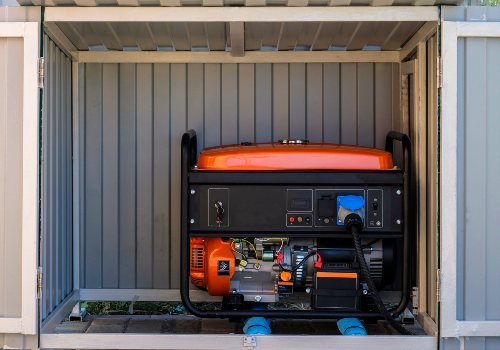
Getting a complete picture of why this bill was brought to the state assembly can help consumers understand the need to change the laws and what negative impacts it may have on consumers.
California Bill 1346 Pros:
- New zero-emission engines will reduce air pollution, causing a significant problem in many regions of California. For comparison, a single gas-engine leaf blower operating for one hour creates the same pollution as driving a car 1,100 miles.
- The bill will push affected equipment manufacturers to implement existing technology that will eliminate harmful emissions. In addition, the state will provide financial incentives to help businesses transition operations for building zero-emission products.
- Starting small by banning off-road gas-engine equipment will make it easier to regulate larger items with gas engines in the future, such as heavy machinery and automobiles.
California Bill 1346 Cons:
- The bill will compromise the ability of California residents and guests to create power when the electrical grid fails. In addition, new zero-emission products will be more expensive and less powerful, creating safety issues when heat, cooling, refrigeration, or medical equipment cannot run properly.
- Switching to rechargeable power tools and equipment will tax the already strained California power grid, as millions of people daily will need to perform yard work or other household duties.
- Running zero-emission equipment is more expensive. For example, the annual cost of running a gas lawn mower is half the cost of running its zero-emission counterpart.
- California’s “aid” to help small businesses is not enough. There are over 50,000 small businesses that the new bill will impact, and the $30 million earmarked for offsetting the cost of buying new equipment will not cover their needs.
- Alternative energy sources are not practical. Sometimes, gas is the best option for affordable and reliable power versus relying on solar power or rechargeable batteries.
How Should RVers Handle California’s Gas Generator Ban?
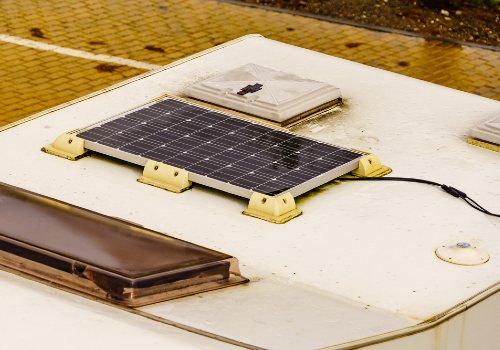
The best way for RVers to deal with California’s new regulations for off-road engines is not to panic. Anyone with an existing gas generator is grandfathered in and can use the equipment legally.
Anyone Californian shopping for an RV generator that runs on gas after the ban takes effect will have to travel to a state that sells them. However, California campgrounds may decide to ban people from operating a gas generator within the park, so keep that possibility in mind.
The best solution for RVers who live or camp in California is to consider buying a propane or diesel generator if you need ample power for more than running camper lights. These alternative generators are readily available and are priced similarly to gas-powered versions.
Lastly, RVers can outfit their camper with solar panels and battery systems to handle much of their power needs when shore power is unavailable. However, installing solar gets expensive fast, and most RVs need more space or gross vehicle weight rating to install large solar power systems that could run large appliances.
- 4000 peak watts / 3200 running watts on gas
- 3700 peak watts / 3000 running watts on propane
- Continuous operation up to 4.5-hours at half load (1.1 Gallon Fuel…
- Ultra lightweight at only 47.3 pounds, ideal for outdoor activity use
- Super quiet, making around 59db at half load
In Summary
The new gas RV generators ban in California by 2028 will change how people camp in the state. Luckily, alternative propane or diesel RV generators can allow campers to boondock or keep their fridge running if the campground has a power outage.
If you live or visit California, Assembly Bill 1346 will eventually impact how people conduct their daily lives. But, there are many years before RVers with gas generators need to worry about the new legislation by California to create zero-emission engine products.
However, it pays to keep this legislation in mind so you can purchase the best alternative when the time comes to maintain your home, run your business, or enjoy fun RV trips!
"Man cannot discover new oceans unless he has the courage to lose sight of the shore."
-- Andre Gide

